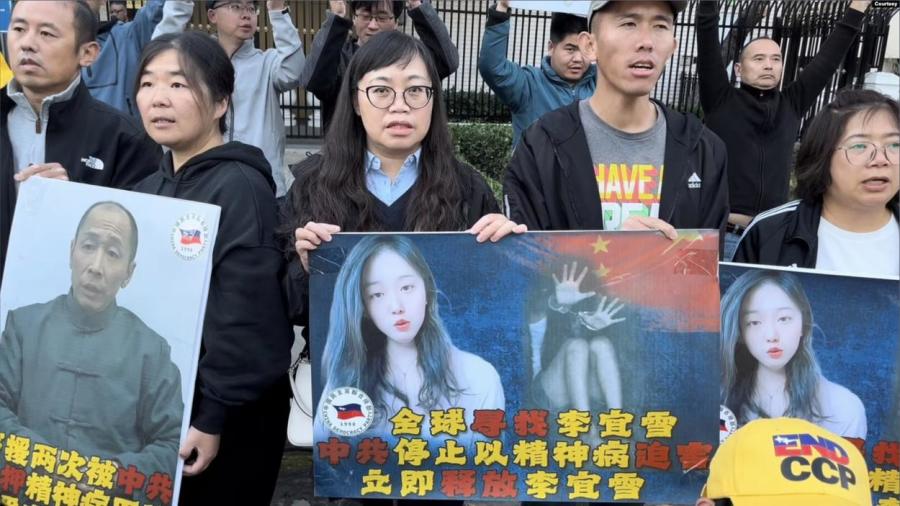On December 22, Chinese activist Jieli Jian organized a protest outside the Chinese consulate in Los Angeles. Protesters not only expressed solidarity with Jiangxi internet personality and rights advocate Li Yixue but also demanded the CCP release all individuals persecuted under the guise of "mental illness," including He Fangmei, Dong Yaoqiong, and Wu Yanan. (Photo provided by Jieli Jian/VOA)
[People News] Does the National People's Congress of the Chinese Communist Party (CCP) represent the people? Not at all. Similarly, the CCP’s mental hospitals do not exist to treat psychiatric patients. Quite the opposite—they aim to destroy the mental health of normal individuals under the guise of political stability.
The CCP’s system of using mental hospitals for maintaining political stability originates from the former Soviet Union. In 1959, Nikita Khrushchev proposed a “creative” theory: in a blissful Soviet society, there should be no opponents of the party and government. Anyone opposing the regime despite their “happy” life must be mentally unstable. Thus, the Soviet Union began turning mental hospitals into tools for political persecution.
The abuse of psychiatric institutions became widespread during the tenure of Soviet General Secretary Leonid Brezhnev. In 1976, Yuri Andropov, Chairman of the KGB, reported to the Secretariat of the Soviet Communist Party on the surveillance of university students over three years. "In three years, there were 324 instances of undesirable behavior involving 4,406 students... Defamatory, inflammatory, revisionist, and other politically harmful opinions were the most common forms of undesirable behavior." Since prisons could not accommodate everyone, psychiatric hospitals became an ideal alternative.
Many prominent figures were labeled as mentally ill and confined to these institutions, such as physicist Andrei Sakharov, poet Joseph Brodsky, and writer and human rights activist Pyotr Grigorenko. During the Soviet era, at least 20,000 individuals were institutionalized for political reasons. By 1989, the Soviet Union’s "Psychoneurological Dispensary" registered approximately 10.2 million patients, with at least 30% being "political mental patients."
During the Cultural Revolution, the CCP began employing similar tactics to persecute political dissidents, almost simultaneously with the Soviet Union. For example, Wang Peiying, a kindergarten worker at the Beijing Railway Design Institute, criticized Mao Zedong’s policies before the Cultural Revolution and requested to leave the CCP. In 1965, she was forcibly sent to a psychiatric hospital. During the Cultural Revolution, the hospital returned her to her workplace for detention. In 1968, she was arrested for shouting "Down with Mao Zedong" in a cafeteria. On January 27, 1970, she was executed by the Beijing Public Security Military Control Commission.
After the reform and opening-up period, such persecution continued and even intensified. According to CCP state media Xinhua News, in 1995, Chen Miaosheng, an employee of Sinopec, was forcibly institutionalized for 13 years by his employer, resulting in his untimely death. In 1996, Guo Yuanrong from Zhuxi County, Hubei Province, was forcibly subjected to "psychiatric treatment" for 14 years after reporting economic misconduct by his superiors. In 2003, Xu Wu, a worker at Wuhan Iron and Steel Corporation, was subjected to over four years of "psychiatric treatment" for suing his employer.
According to statistics from the human rights website "Civil Rights Observer," the organization recorded 510 cases of "political mental patients" across China between December 2007 and 2017. Particularly after Xi Jinping came to power, the emphasis on ideological stability has led to a surge in such cases.
In July 2018, Dong Yaoqiong was diagnosed with mental illness and confined to a psychiatric hospital in her hometown in Hunan Province after splashing ink on a portrait of Xi Jinping in Shanghai. She was discharged on January 2, 2020. Dong's father revealed that she became withdrawn and taciturn after her release, a stark contrast to her lively personality before being institutionalized.
In April 2020, Feng Xiaoyan, a deputy researcher at the Linyi Municipal People’s Congress, was forcibly admitted to the Fourth Psychiatric Hospital of Linyi, Shandong Province, after distributing political leaflets in Beijing's Wangfujing area. According to her daughter Alice, Feng suffered severe physical and mental damage during her confinement. Alice described her mother as having slurred speech, slower thought processes, stiff movements, a dull expression, and severe back pain. After her release on July 25, Feng was forced to take medication at home, including lithium carbonate sustained-release tablets (twice daily), paliperidone extended-release tablets (once in the morning), and quetiapine fumarate tablets (once daily).
Alice told reporters from Radio Free Asia that Feng had never undergone any psychiatric evaluation. Despite a lack of evidence proving her mother was mentally ill or legally incapacitated, police forcibly dragged her to the hospital. Alice herself faced house arrest and surveillance while trying to rescue her mother. She reported that her movements and speech remain restricted. Alice accused the Fourth People's Hospital of Linyi and its medical staff of severe violations of the Mental Health Law and alleged crimes including medical malpractice, illegal detention, intentional harm, and even attempted murder.
In 2013, the CCP officially implemented the Mental Health Law, which ostensibly promotes voluntary hospitalization for psychiatric disorders. However, the use of forced psychiatric treatment as a means to suppress dissent has intensified. Overseas anti-CCP activist Jie Lijian, who experienced forced psychiatric treatment in China, remarked, “Psychiatric hospitals are worse than concentration camps and more terrifying than prisons. Medical accidents happen constantly, and patients are forcibly administered hormone-based drugs that lead to weight gain, cognitive decline, emotional numbness, and permanent health damage. For the powerful, psychiatric diagnoses provide immunity—even for murder. But for ordinary citizens, the state has full discretion. You can be institutionalized indefinitely at any time, often without due process.”
Qian Yun, now exiled in France, was institutionalized after questioning distortions in CCP history textbooks. She recalled, “They fabricate mental illness diagnoses for you. I never applied for a psychiatric certificate, but they created one for me anyway. From that point on, I was officially deemed mentally ill. The CCP can arrest and control you whenever it wants. Once you express dissenting views, you can be taken to a psychiatric hospital for forced treatment. After that, you are no longer yourself.”
The CCP’s use of psychiatric hospitals as de facto prisons to persecute dissenters is a systematic, institutionalized practice. Doctors and police collude to commit crimes while evading legal accountability. Psychiatric hospitals, much like the now-abolished labor camps, function as extrajudicial entities that undermine the rule of law.
From a medical perspective, China’s Classification and Diagnostic Criteria for Mental Disorders (CCMD-3) includes “Paranoid Personality Disorder” (60.1 [F60.0]) as a diagnosis. This classification encompasses behaviors such as “persistent pursuit of individual rights,” and feelings of “oppression and persecution, often accompanied by appeals or petitions that do not cease until demands are met.” Such criteria effectively allow petitioners and homeowners resisting eviction to be diagnosed as mentally ill. Reports indicate that nearly half (51.02%) of petitioners diagnosed with personality disorders fall into this category.
From a legal standpoint, the Mental Health Law stipulates that individuals with severe mental disorders may be hospitalized if they meet one of the following criteria:
1. They have already harmed themselves or are at risk of doing so.
2. They have already endangered others' safety or are at risk of doing so.
These broad criteria give public authorities sweeping powers to institutionalize individuals under claims of potential danger. Once declared incapacitated, victims are unable to seek legal recourse.
Procedurally and financially, psychiatric hospitals have a vested interest in detaining patients. Hospitals require that patients be discharged only to the individual who admitted them, often a public authority in cases of political persecution. Families cannot retrieve their loved ones without official approval. Psychiatric facilities profit significantly, earning tens of thousands of yuan per patient, creating further incentives to prolong confinement.
At its core, the psychiatric system functions as a stability-maintenance tool for the CCP. It operates with efficiency and impunity, granted extraordinary powers by the regime. Currently, the case of Li Yixue, who has been institutionalized for a second time, raises grave concerns. In 2003, the death of university student Sun Zhigang in a detention center sparked the abolition of the labor camp system. Today, Li Yixue has taken on the role of a whistleblower, directly challenging the CCP’s psychiatric oppression system. However, the outlook remains bleak. Over the past decade, the CCP has regressed politically, doubling down on high-pressure stability measures and intensifying social control through its Fengqiao Experience practices. China is rapidly turning into the world’s largest mental asylum.
(Originally published in People News)











News magazine bootstrap themes!
I like this themes, fast loading and look profesional
Thank you Carlos!
You're welcome!
Please support me with give positive rating!
Yes Sure!